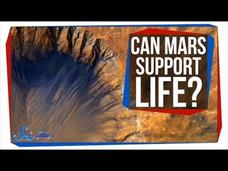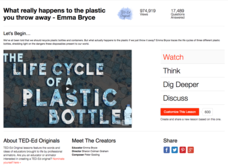Fuse School
Life Cycle Assessment
What happens to your cell phone when you're done with it? Analyze the life cycle assessment of a cell phone and its impact on the environment. The detailed lesson challenges learners to think about their decisions and how they affect the...
Howard Hughes Medical Institute
Dengue Virus Life Cycle
Dengue Virus leads to the deaths of around 25,000 people, mostly children, every year. Scientists understand how the virus gets into cells and replicates, but they still struggle to prevent it. Curious scholars view an animation of the...
Learning Games Lab
Choosing A Career
Careers in science aren't limited to labs. Pupils learn about different aspects of careers in agriculture through the lens of several scientists. The scientists talk about how the field of soil science is a growing in this important...
Crash Course
The History of Life on Earth
The first life on Earth developed in the oceans. As an introduction to ecology, the video starts with the formation of the earth. It follows with the Archaean and Proterozoic Eons including protobionts, prokaryotes, and eukaryotes. It...
Environment Agency - Abu Dhabi
Marine Life
Less than a minute long, this video shows a few examples of different types of animals that live in the ocean. Refer to the "Marine Life" tutorial for additional information for your students to reference. Follow-up with a seven question...
Bozeman Science
Environmental Matter Exchange
Why did carbon marry hydrogen? They bonded well from the minute they met. Here is a video that focuses on the essential chemicals for life: water, carbon, nitrogen, and phosphorus. It relates each of these to macromolecules and the way...
SciShow
Could Complex Life Survive on Mars?
Is there life on Mars? Is it likely? A video lesson analyzes the possibility of life on Mars. The discovery of water on Mars changes how scientists think about the likelihood of life on the red planet. Part of the SciShow Space series,...
Bozeman Science
LS3B - Variation of Traits
Make sure your unit on trait variation causes a sensation! Take an in-depth look at standard LS3B, an important component of the Next Generation Science Standards. The narrator discusses methods of delivering the standard to younger...
SciShow
How to Live Forever? Be a Jellyfish
The turritopsis dohrnii, or immortal jellyfish, are tiny, with adults measuring only 0.18 inches tall and wide. The narrator of this short video explores the immortal jellyfish and the importance of their unique and amazing lives. These...
TED-Ed
Biodiesel: The Afterlife of Oil
Use this slick video to introduce your environmental scientists to the wonders of biodiesel. They will learn about problems caused by our waste oil, how it can be recycled, and other benefits of using biofuels. Use the video, assessment...
TED-Ed
The Life Cycle of a T-Shirt
Did you know that 2,700 liters of water are required to produce just one t-shirt? Or that cotton uses more insecticides and pesticides than any other crop? An engaging video traces the cycle of t-shirt production from cotton bolls to the...
Fuse School
Reducing Particulates (Soot)
Understand your daily role in environmental chemistry. An informative video discusses the origination of particulate matter in our world. It considers both indoor and outdoor origination of particulates and how to reduce their impacts.
Fuse School
Recycling Paper
From tree to paper to fuel — explore the life of a sheet of paper! An interesting lesson explains the benefits and challenges of recycling paper. Pupils learn you can only recycle paper a limited number of times before it is processed...
California Acadamy of Sciences
Science Informing Art
What does art have to do with science? Follow Maya Lin, an artist and environmental activist who recently installed a piece of art at the California Academy of Sciences. Kids will learn about her mission to spread global awareness...
Fuse School
What Is The Natural Greenhouse Effect?
The Greenhouse Effect is a big part of why Earth is able to sustain life. But, how much is too much? In part two of an eight-part series about the carbon cycle, environmental scholars learn how the natural Greenhouse Effect keeps us warm...
TED-Ed
What Really Happens to the Plastic You Throw Away
Inspire environmentally conscious young minds with an exceptional video, which traces the life cycles of three different plastic bottles after they are thrown away and move through the earth with different journeys through a...
TED-Ed
Climate Change: Earth's Giant Game of Tetris
In this colorful animation, our current problem with climate change is likened to a block-stacking game of Tetris. Greenhouse gases are increasing in the atmosphere at an increasing rate. Can we place them properly before it's too late?...
Fuse School
Synthetic Polymers
The use of biodegradable polymers revolutionized many branches of medicine. The video explains what synthetic polymers are and why they are important. Through numerous examples of real-life applications, scholars learn their importance...
TED-Ed
Attack of the Killer Algae
Invasive species can remind us of a horror film! In this video, an algae, popularly used in home aquariums, gets out and takes over coastal ecosystems, destroying the native organisms. The bright side, however, is an example where...
TED-Ed
The Nurdles’ Quest for Ocean Domination
Nurdles aren't the cute characters of a new children's cartoon, they are the tiny plastic pellets slowly polluting the world's water supply. Learn all about these little trouble makers with this short video that explores the impacts...
Learning Games Lab
Understanding the Major
The purpose of university courses is not always clear. A comprehensive video presentation explains the importance of a well-rounded education and a complete college experience. Professionals discuss how their post-secondary educations...
TED-Ed
How Quantum Mechanics Explains Global Warming
What do quantum mechanics and global warming have to do with each other? More than you might think. Surprisingly, this video explains how it's not the energy emitted from the sun that causes the problem, but how the infrared radiation...
TED-Ed
The Survival of the Sea Turtle
Sea turtles face a lot of adversity: storms, predators on land and in the sea, and eggs that don't hatch, but the biggest threat to these magnificent and ancient creatures is human activity. From poaching to pollution, from trash to...
TED-Ed
What Is the Tragedy of the Commons?
What's good for all of us is good for each of us. The Tragedy of the Commons refers to a situation in which one person's decision to act in his or her own best interest negatively affects the rest of the population—and ultimately, him or...























